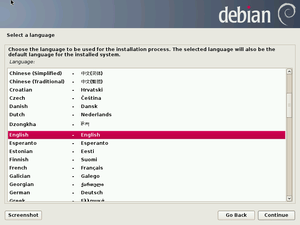Debian-Installer
 | |
| Original author(s) | Debian Project |
|---|---|
| Developer(s) | Debian Install System Team |
| Initial release | June 6, 2005 |
| Stable release |
8.0 (Jessie)
/ April 25, 2015[1] |
| Written in | C |
| Operating system | Microcosm of Debian, made of udebs. (Loading from Microsoft Windows is supported via win32-loader.) |
| Available in | 87 languages |
| Type | System installer |
| License | GPL |
| Website |
www |
Debian-Installer is an installation program designed for the Debian Linux distribution. It originally appeared in Debian release 3.1 (Sarge),[2] released on June 6, 2005,[3] although the first release of a Linux distribution it was used with was Skolelinux Venus (1.0).[4] It is also one of two official installers available for Ubuntu; the other being called Ubiquity (itself based on parts of debian-installer) which was introduced in Ubuntu 6.06 (Dapper Drake).
It makes use of cdebconf (a reimplementation of debconf in C) to perform configuration at install time.
Originally, it was only supported under text-mode and ncurses. A graphical front-end (using GTK+-DirectFB) was first introduced in Debian 4.0 (Etch). Since Debian 6.0 (Squeeze), it is used over Xorg instead of DirectFB.
debootstrap
debootstrap is software which allows installation of a Debian base system into a subdirectory of another, already installed operating system.[5] It needs access to a Debian repository and doesn't require an installation CD.[5] It can also be installed and run from another operating system or to create a "cross-debootstrapping", a rootfs for a machine of a different architecture,[5] for instance, OpenRISC.[6] There is also a largely equivalent version written in C – cdebootstrap, which is used in debian-installer.[5]
Debootstrap can be used to install Debian in a system without using an installation disk but can also be used to run a different Debian flavor in a chroot environment.[7] This way it is possible to create a full (minimal) Debian installation which can be used for testing purposes, or for building packages in a "clean" environment (as e.g. pbuilder does).[7]
See also
References
- ↑ "Debian "jessie" Release Information". Debian. Retrieved 2015-04-27.
- ↑ "Debian GNU/Linux 3.1 released". Debian. 2005-06-06. Retrieved 2015-04-27.
- ↑ "Debian "sarge" Release Information". Debian. Retrieved 2015-04-27.
- ↑ "First distribution ships with Debian-Installer". Debian. 2004-06-21. Retrieved 2015-04-27.
- 1 2 3 4 "Debootstrap". Debian wiki.
- ↑ Svensson, Christian. "[Openrisc] Introducing: Debian for OpenRISC". Openrisc mailing list. OpenCores.org, equivalent to ORSoC AB. Archived from the original on 4 March 2014. Retrieved 27 February 2014.
- 1 2 "debootstrap". Debian man pages.
